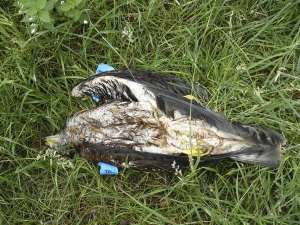Over the last 100 years ringers have individually marked over 34 million birds, only around 1% of these are subsequently recovered.
Every single ring reported adds to our knowledge of the life history of the birds and helps us understand what issues are effecting them.
As top predators, raptors are often the first species to be affected by a range of environmental pressures, such as habitat availability and quality, prey populations, pollutants and human disturbance. Raptors can provide a cost-effective and sensitive means of detecting environmental change, as was so successfully demonstrated through pioneering research on the response of birds of prey to organochlorines in the environment.
What would you do if you found a bird with a ring?
Please report any ringed bird that you find to the national ringing centre of your country (see http://www.euring. org) or directly to www.ring.ac
| What Ring? |
Write down the ring number and words and, if the bird is dead, please enclose the ring taped to your letter. The ring will be returned to you if you wish to keep it.
|
|
| Where? |
Give the location where the bird was found including the name of the nearest town or village and a grid reference if possible.
|
|
| When? |
Give the date the ringed bird was found.
|
|
| The Circumstances |
Say if the bird was alive or dead. If dead, please give the cause of death if known, e.g. was it hit by a car, brought by a cat, or found oiled on a beach? Also note if the bird was freshly dead or decomposed etc. If the bird is alive please say what happened to it.
|
|
| What Bird? |
Write down the type of bird or species, if you know. You might also send a photograph of the bird.
|
|
| Your Details |
Remember to give your name and address so that you can be sent the information about when and where the bird had been ringed. Details will normally be sent within a month, but there may be delays at busy times of the year.
|
If you find a dead Bird of prey or Owl, (if it’s ringed please report it), it would be a big help if you could contact the Predatory Bird Monitoring Scheme. They will supply a postage paid box and after analysis, send you a copy of their findings. Instructions on how to send a dead bird can be found through this link.
However, if you believe that the bird has been illegally killed, then the police should be contacted in the first instance and asked if the matter can be referred to a Wildlife Crime Officer (WCO).
** Some of the poisons used to illegally kill raptors are extremely toxic to people, so suspected poisoned baits or victims should not be touched. Instead carcasses should be covered if possible (without destroying evidence) until the police or other authorised persons can retrieve them for analysis. The police should be informed of the location of the suspected poison as soon as possible
Please contact Peak District Raptor Monitoring Group if you need any information or help collecting, sending or reporting dead Birds of Prey or Owls

